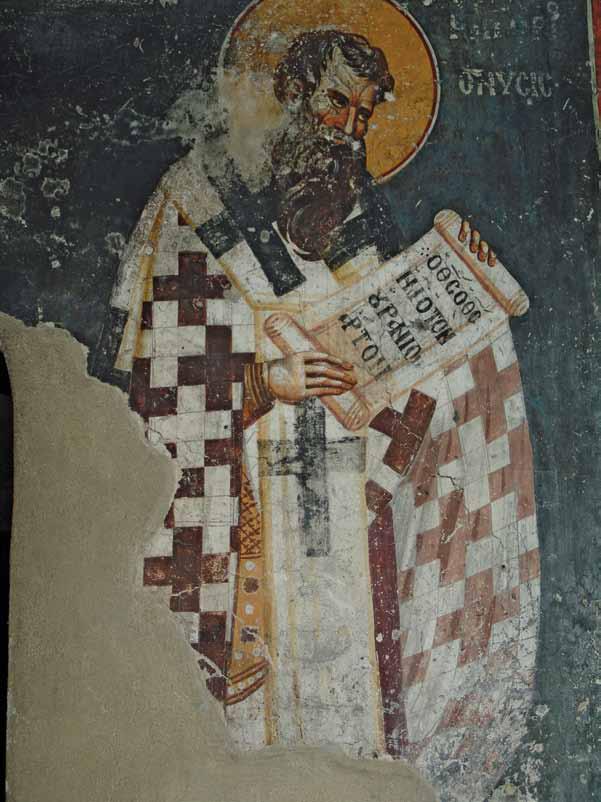The early founders of the Christian faith sometimes had their own opinions on the then-obscure subject of evolution, and they often held very strong views on the Biblical literalism which drives modern Creationism. They were against it.
The following are quotes from some of the most important figures in the history of Christianity, for the benefit of those who find themselves arguing with Creationists.
Origen of Alexandria, 3rdC Christian philosopher and Church Father

Origen, also called Origen Adamantius, was the author of De Principiis, On the First Principles, the first-ever systematic treatise on Christian theology. A translation is available free of charge here. Book IV expounds at mind-numbing length on the idea that Biblical stories are rarely to be taken literally, citing the example of the hypothetical cases which are included in the sections on legislation. In Book IV:16 he addresses the specific case of Genesis.
It was not only, however, with the [Scriptures composed] before the advent [of Christ] that the Spirit thus dealt; but as being the same Spirit, and [proceeding] from the one God, He did the same thing both with the evangelists and the apostles,—as even these do not contain throughout a pure history of events, which are interwoven indeed according to the letter, but which did not actually occur. Nor even do the law and the commandments wholly convey what is agreeable to reason. For who that has understanding will suppose that the first, and second, and third day, and the evening and the morning, existed without a sun, and moon, and stars? And that the first day was, as it were, also without a sky? And who is so foolish as to suppose that God, after the manner of a husbandman, planted a paradise in Eden, towards the east, and placed in it a tree of life, visible and palpable, so that one tasting of the fruit by the bodily teeth obtained life? And again, that one was a partaker of good and evil by masticating what was taken from the tree? And if God is said to walk in the paradise in the evening, and Adam to hide himself under a tree, I do not suppose that anyone doubts that these things figuratively indicate certain mysteries, the history having taken place in appearance, and not literally.
St Gregory of Nyssa, 4thC Bishop of Nyssa in Cappadocia

Gregory was an early Christian theologian who was one of the influential group known as the Cappadocian Fathers. He made significant contributions to the doctrine of the Trinity and to the Nicene Creed.
[N.B. In this context, the “prosthesis” referred to in the label of the illustration is a table on which bread and wine are prepared for the Divine Liturgy in the Eastern-Orthodox and Greek-Catholic churches.]
In his 1894 work on early evolutionary thought, From the Greeks to Darwin, Henry Fairfield Osborn wrote that Gregory of Nyssa started “the movement towards a partly naturalistic interpretation of the order of Creation” which was later picked up by St Augustine, and taught that “Creation was potential. God imparted to matter its fundamental properties and laws. The objects and completed forms of the Universe developed gradually out of chaotic material”.
Gregory himself said this:
Scripture informs us that the Deity proceeded by a sort of graduated and ordered advance to the creation of man. After the foundations of the universe were laid, as the history records, man did not appear on the earth at once, but the creation of the brutes preceded him, and the plants preceded them. Thereby Scripture shows that the vital forces blended with the world of matter according to a gradation; first it infused itself into insensate nature; and in continuation of this advanced into the sentient world; and then ascended to intelligent and rational beings.
St Augustine of Hippo, 4th/5thC Bishop of Hippo Regius in Numidia

St Augustine was a hugely important Church Father and theologian, whose writings shaped the Mediaeval worldview and heavily influenced Western philosophy and Western Christianity. Contemporaries thought that he had reinvigorated and re-established Christianity itself.
[N.B. There are many grand and dignified imagined portraits of St Augustine, generally showing him as a white European although in reality he was a Berber. But this one, showing him as a wizened little old brown, bald guy, is the earliest, made a century after his death. It’s in the Sancta Sanctorum, a Roman Catholic chapel entered via the Scala Sancta of the Lateran Palace in Rome, and the original private chapel of the papacy.}
Augustine had very strong views on the damage done to Christianity by Christians who brought Christianity into disrepute by insisting on a literal interpretation of Biblical passages which claimed things which non-Christian could see were obviously not literally true, thus making themselves and their religion appear ignorant and foolish. In De Genesi ad Litteram, The Literal Meaning of Genesis, Book 1 Chapter 19 Paragraph 39, he wrote:
Usually, even a non-Christian knows something about the earth, the heavens, and the other elements of the world, about the motion and orbit of the stars and even their size and relative positions, about the predictable eclipses of the sun and moon, the cycles of the years and the seasons, about the kinds of animals, shrubs, stones, and so forth, and this knowledge he holds to as being certain from reason and experience. Now, it is a disgraceful and dangerous thing for an infidel to hear a Christian, presumably giving the meaning of Holy Scripture, talking nonsense on these topics; and we should take all means to prevent such an embarrassing situation, in which people show up vast ignorance in a Christian and laugh it to scorn. The shame is not so much that an ignorant individual is derided, but that people outside the household of faith think our sacred writers held such opinions, and, to the great loss of those for whose salvation we toil, the writers of our Scripture are criticized and rejected as unlearned men. If they find a Christian mistaken in a field which they themselves know well and hear him maintaining his foolish opinions about our books, how are they going to believe those books in matters concerning the resurrection of the dead, the hope of eternal life, and the kingdom of heaven, when they think their pages are full of falsehoods on facts which they themselves have learnt from experience and the light of reason? Reckless and incompetent expounders of Holy Scripture bring untold trouble and sorrow on their wiser brethren when they are caught in one of their mischievous false opinions and are taken to task by those who are not bound by the authority of our sacred books. For then, to defend their utterly foolish and obviously untrue statements, they will try to call upon Holy Scripture for proof and even recite from memory many passages which they think support their position, although they understand neither what they say nor the things about which they make assertion [quoting 1 Tim 1:7].
He was a prophet, was Augustine: he foresaw the immense damage which Creationists have done to the public standing of Christianity, and of religion in general – quite unfairly, since even among Protestant Christians, Creationists are generally seen as an embarrasing lunatic fringe.
In the preface of the same book, he wrote:
In all sacred books, we should consider the eternal truths that are taught, the facts that are narrated, the future events that are predicted, and the precepts or counsels that are given. In the case of a narrative of events, the question arises whether everything must be taken according to the figurative sense only, or whether it must be expounded and defended also as a faithful record of what happened. No Christian would dare say that the narrative must not be taken in a figurative sense [that is, no Christian would dare say the narrative must be taken literally]. For St. Paul says: Now all these things that happened to them were symbolic. [1 Cor 10:11] And he explains the statement in Genesis, And they shall be two in one flesh, as a great mystery in reference to Christ and to the Church. [Eph 5:32]
Later, with specific reference to Genesis, he says that a “day” in the Genesis I story is not a mundane 24-hour day:
But at least we know [the days of creation] are different from the ordinary day of which we are familiar
[cut]
The things [God] had potentially created… [came] forth in the course of time on different days according to their different kinds… [and] the rest of the earth [was] filled with its various kinds of creatures, [which] produced their appropriate forms in due time.
In his De Genesi contra Manichæos, he says:
To suppose that God formed man from the dust with bodily hands is very childish. …God neither formed man with bodily hands nor did he breathe upon him with throat and lips.
In other works, he speculated that some creatures came from “decomposition” of previously existing organisms: that is, by spontaneous generation from “filth”, an idea inspired by the seemingly mysterious way maggots appear in decaying matter. As an extension of this, he speculated that “certain very small animals may not have been created on the fifth and sixth days, but may have originated later from putrefying matter.” That is, he believed that at least some organisms were not directly created by God, but evolved later through a natural process – even if his ideas about how that process worked were hazy.

Creationists, beware: St. Augustine goes BANG.